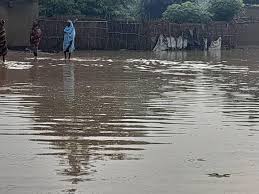Bad weather can lead to outbreaks of diseases, potential epidemics, and disruptions to caring for the chronically ill, according to the World Health Organization (WHO) which has declared a state of emergency in flood-hit Chad.
Heavy rains and the annual flooding of the Chari and Logone rivers have caused inundations that severely affect the population.
All 18 of Chad’s 23 provinces were affected by the floods, forcing many to leave their homes.
This situation is likely to cause numerous illnesses and potential epidemics and may result in a breakdown in caring for the chronically ill.
The World Health Organization has therefore provided the Ministry of Health with essential drug kits for the treatment of certain endemic diseases in Chad.
The kits include essential medicines for 1,000 people for three months, 100 malaria kits to treat 3,000 people for three months and two cholera kits to treat at least 200 cases of cholera.
In the capital, Ndjamena, a district of the city has been submerged under water while nearly 100,000 people are in collective reception centers identified by the national authorities, according to a report by the UN Office for the Coordination of Humanitarian Affairs (OCHA).
The WHO is coordinating the interventions of the different partners of the Chadian health cluster through a rational management of resources for the management of primary health care, reproductive health, gender-based violence, mental health and emergency medical care of the disaster victims.
Under the leadership of the WHO incident manager in Chad, a health emergency team of three epidemiologists and an information manager has been formed to support the cluster and strengthen prevention response measures against possible epidemics.
Surveillance of chronic diseases also remains a priority, and an alert has been issued to the HIV and tuberculosis programs to ensure the continuity of services through the availability of anti-tuberculosis drugs and ARVs in the disaster camps.
Medical consultations are also conducted daily in each of these camps by actors of the health cluster, such as Premier Urgence, ALIMA (Medecin Sans Frontiere)…
According to the Medical Officer of Medecin Sans Frontiere, Dr. Patrick Tambwe, “nearly 120 consultations are made per day and the most recurrent diseases in these consultations are malaria, respiratory and acute infections, diarrhea and occasionally some skin infections…The patients benefit from an ambulatory treatment with free medicines.”
In ten days of activities, eleven patients on average, in critical situation, were referred to the Peace Hospital in Ndjamena to benefit from more adequate care.
For Dr. Patrick, the permanent exchange platform provided by WHO through the health cluster allows the different actors to discuss and find solutions to certain challenges during the emergency situation.
TE/fss/as/APA


